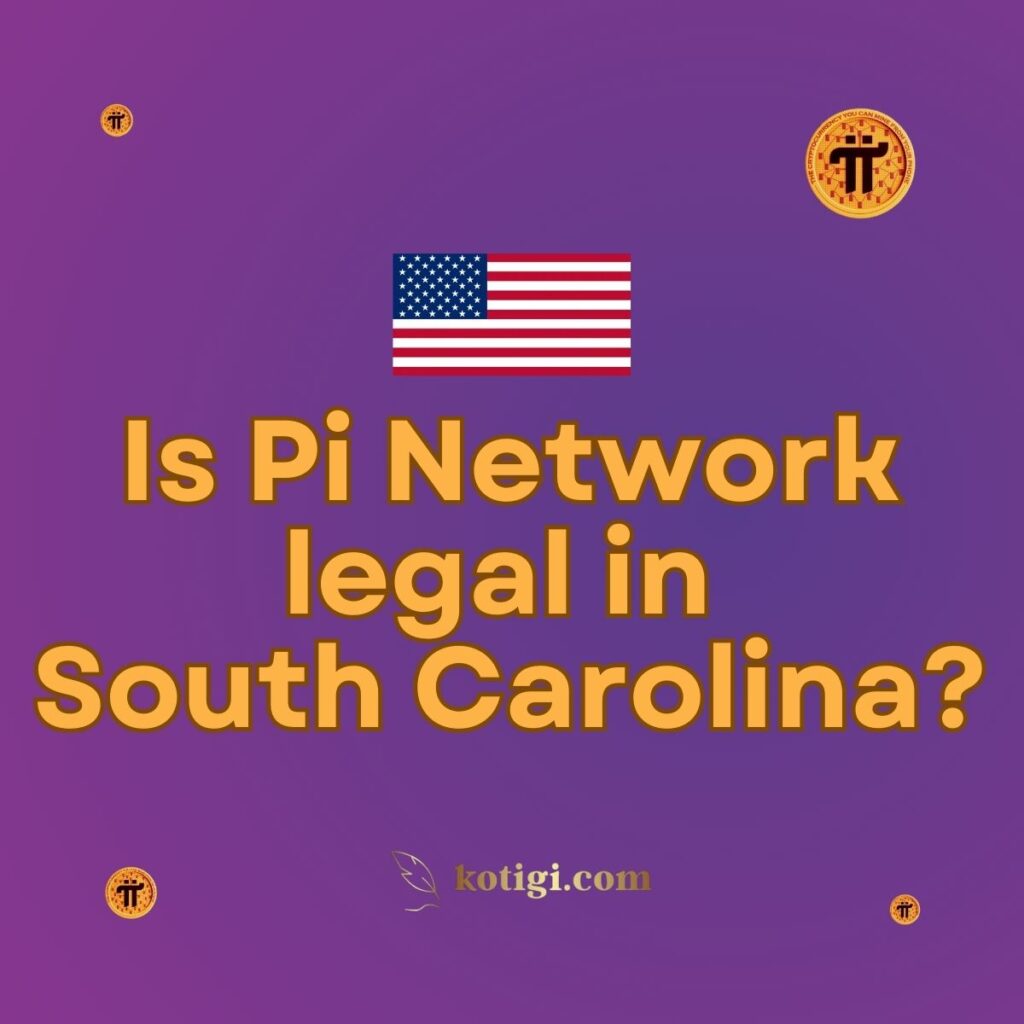
Is Pi Network legal in South Carolina?
Yes, Pi Network is legal for South Carolina residents to use and participate in. However, users should be aware that while the app is accessible, the lack of official U.S. regulation specific to Pi Network means users should stay updated on its terms, compliance policies, and industry standards. While the app and its services are available, users should remain informed about ongoing cryptocurrency regulations in not only the U.S. but also in the state of South Carolina to stay compliant and secure.
Introduction
Pi Network has sparked interest worldwide by offering a unique, mobile-friendly cryptocurrency mining experience. In South Carolina, as in many other U.S. states, Pi Network’s legal standing is shaped by federal guidelines and the lack of specific local cryptocurrency laws. This article explores the legal considerations, compliance expectations, and best practices for using Pi Network in South Carolina, offering a complete view of its current and potential regulatory landscape.
1. Overview of Pi Network and Its Presence in South Carolina
1.1 Introduction to Pi Network
Pi Network enables mobile-based cryptocurrency mining with a focus on accessibility and minimal environmental impact. It’s designed for users looking to enter the crypto world without high-tech hardware, appealing to a broader audience.
1.2 Growth of Cryptocurrency Interest in South Carolina
South Carolina has seen a growing interest in cryptocurrencies and blockchain technology, driven by a desire to innovate within financial technology. The state, while conservative in legislation, shows steady adoption among individuals.
1.3 Existing Cryptocurrency Regulations
While South Carolina follows federal cryptocurrency guidelines, it has not yet implemented specific state regulations for crypto mining or mobile-based networks like Pi Network. This allows users flexibility in accessing platforms that may be more heavily regulated elsewhere.
1.4 Legal Accessibility for Pi Network in the State
Pi Network’s mobile application is legally accessible in South Carolina, with no restrictions preventing residents from downloading and participating in its ecosystem. However, users should still exercise caution with any financial activity.
2. Legal Considerations for Pi Network Users
2.1 Lack of Specific Cryptocurrency Laws in South Carolina
South Carolina does not currently impose distinct cryptocurrency legislation, focusing instead on federal guidance. This lack of specific state restrictions means that Pi Network users can engage without violating local laws.
2.2 Adhering to Federal Compliance
At the federal level, U.S. regulatory bodies like the SEC and CFTC monitor cryptocurrency markets and trading. However, as Pi Network tokens are not yet available on public exchanges, the network does not fall directly under these regulations.
2.3 Privacy and Data Security Standards
Users in South Carolina should verify that Pi Network upholds data privacy and security standards, as the app collects basic user information. It is recommended that users familiarize themselves with the platform’s privacy policy.
2.4 Monitoring Future Legal Changes
The legal landscape for cryptocurrencies is evolving, and future changes may impact Pi Network’s standing. South Carolina residents should stay informed on any legislative developments that could affect their use of Pi Network.
2.5 Verifying Token Legitimacy
As Pi tokens currently lack a public exchange value, users should approach the network as an experimental platform. Verifying token legitimacy before potential exchange listing will help avoid financial misunderstandings.
3. Compliance Requirements for South Carolina Users
3.1 Know Your Customer (KYC) Protocol
Pi Network requires users to complete a KYC verification, enhancing trust and alignment with compliance standards. South Carolina users must complete this step for security and potential exchange access.
3.2 Record-Keeping for Tax Purposes
Though Pi tokens do not hold a set value, keeping accurate records of mining activity can be beneficial should tax obligations arise in the future. Documenting earnings and activity ensures users are prepared.
3.3 IRS Cryptocurrency Guidelines
The IRS considers cryptocurrency holdings as taxable assets. South Carolina residents using Pi Network should be aware that even if Pi tokens lack current market value, taxation guidelines could apply post-exchange.
3.4 Maintaining Data Security
Pi Network’s KYC compliance and data security protocols help protect user information. However, users should also secure their accounts with strong passwords and avoid sharing personal data publicly.
4. Engaging with Pi Network within South Carolina
4.1 Opportunities for Local Community Involvement
Engaging with local blockchain communities can benefit Pi Network users, providing access to resources, knowledge-sharing, and updates on regulatory considerations specific to South Carolina.
4.2 Education and Awareness Efforts
Pi Network can promote awareness by collaborating with local educational institutions or hosting informational events. This will help South Carolina users better understand Pi’s ecosystem, mining principles, and safety protocols.
4.3 Virtual Events and Community Webinars
Hosting webinars and virtual events tailored for South Carolina residents can address concerns, answer questions, and reinforce community ties within the state’s Pi Network community.
4.4 Impact of Regional Adoption Rates
As adoption grows regionally, it may influence broader acceptance. South Carolina’s open-minded approach to cryptocurrency could shape the platform’s trajectory as it progresses toward mainstream adoption.
5. Current and Future Use of Pi Tokens
5.1 Potential Future Use Cases
While Pi tokens are not yet exchangeable, future use cases could include transactions, purchases, and decentralized applications. South Carolina users may find eventual utility in Pi tokens, pending network maturity.
5.2 Value Realization on Exchange Listings
Should Pi tokens be listed on exchanges, users could realize monetary value. South Carolina residents interested in Pi’s investment potential should monitor announcements from Pi Network regarding such developments.
5.3 Speculative Nature of Pi Tokens
Currently, Pi tokens represent potential value rather than realized currency. South Carolina users should approach Pi Network participation as a speculative activity rather than a guaranteed financial return.
5.4 Importance of Network Development
The utility of Pi tokens depends on Pi Network’s continued growth, strategic partnerships, and user engagement. South Carolina users play a role in supporting these developments by engaging with the app and its community.
6. Legal Implications of Cryptocurrency Transactions
6.1 Federal Cryptocurrency Transaction Standards
South Carolina follows federal standards regarding crypto transactions, which generally concern exchange-traded cryptocurrencies. For now, Pi Network’s inaccessibility on exchanges exempts it from direct transaction regulation.
6.2 State-Level Considerations for Pi Network
South Carolina does not regulate in-state cryptocurrency transactions beyond general guidelines, allowing Pi Network users freedom within legal boundaries. Residents should still verify that activities align with the app’s terms.
6.3 Staying Compliant with Tax Obligations
Pi Network’s current status exempts users from immediate tax obligations. However, South Carolina users should track developments, as potential value realization may invoke tax requirements in the future.
6.4 Federal Consumer Protection Standards
Consumer protection guidelines apply to all financial technology platforms, including cryptocurrency applications. South Carolina users should look out for potential updates or warnings from consumer protection agencies.
7. Anticipated Changes in Crypto Regulation
7.1 Proposed Federal Crypto Legislation
Federal legislation on cryptocurrencies is evolving, with potential changes that may apply to networks like Pi. South Carolina users should monitor these changes as they could impact compliance requirements in the state.
7.2 State Cryptocurrency Task Forces
States like New York have formed task forces to study cryptocurrency impacts; if South Carolina follows suit, it could lead to local legislation. Staying updated will help Pi Network users adjust to any regulatory changes.
7.3 Adapting to Industry Standards
As the crypto industry matures, platforms like Pi Network may be required to adopt broader industry standards, potentially impacting South Carolina’s user guidelines and requirements.
7.4 International Regulation Influences
Regulatory changes outside the U.S., particularly in regions where Pi Network has a large user base, may influence its policies. South Carolina users should remain aware of global regulatory trends for potential impacts.
8. Opportunities for Pi Network’s Expansion in South Carolina
8.1 Potential Collaborations with Local Businesses
Partnering with South Carolina businesses could enhance Pi Network’s reach and reputation in the state, opening doors to expanded user engagement and acceptance in the commercial sector.
8.2 Collaboration with Educational Institutions
Engaging South Carolina’s universities in research or educational initiatives on blockchain and cryptocurrency could increase the platform’s visibility, attract new users, and foster blockchain literacy within the state.
8.3 Exploring Blockchain Innovation Programs
South Carolina is increasingly interested in blockchain for various sectors. Pi Network can capitalize on this trend by participating in state innovation initiatives that could help increase the platform’s adoption.
8.4 Fostering Community Initiatives
Pi Network can hold South Carolina-specific community events to build a network of supporters and engaged users. This can include online forums, meet-ups, or educational workshops that emphasize blockchain security and network benefits.
8.5 Collaborations for Enhanced Compliance and Awareness
Working with local agencies or consumer protection advocates can provide South Carolina users with trusted information, helping Pi Network maintain transparency and improve community relations within the state.
Conclusion
Pi Network’s legality in South Carolina is clear, with no regulations currently preventing residents from participating. As the cryptocurrency landscape continues to evolve, South Carolina users should remain proactive, staying informed on both federal and local updates that may affect their experience on the platform. By prioritizing compliance, maintaining security practices, and engaging with the local community, Pi Network participants in South Carolina can enjoy a secure and legally compliant user experience.
Key Takeaways
- Legality of Participation: Pi Network is fully legal for residents of South Carolina, allowing them to mine and use the platform without facing state-level restrictions.
- Understanding Compliance: While South Carolina currently has no specific tax obligations for Pi tokens, users should keep thorough records of their mining activities and any potential earnings to ensure they remain prepared for future tax requirements.
- Future Potential of Pi Tokens: As the Pi Network evolves, its tokens may eventually gain significant market value and usability. Users should stay informed about developments regarding exchange listings and token utility.
- Data Security Awareness: It is crucial for South Carolina users to familiarize themselves with Pi Network’s data privacy and KYC protocols. Implementing strong security practices will help protect personal information from potential breaches.
- Community Engagement is Key: Active participation in local events and initiatives can greatly enhance the visibility and acceptance of Pi Network in South Carolina. Users are encouraged to engage with local blockchain communities and educational institutions to foster growth and understanding of the platform.
- Stay Updated on Regulatory Changes: Cryptocurrency regulations are continuously evolving. Users should keep an eye on both federal and state-level legal changes to ensure compliance and make informed decisions regarding their participation in the Pi Network.
- Proactive Involvement in Local Initiatives: Collaborating with local businesses and community organizations can further establish Pi Network’s presence in South Carolina, paving the way for innovative uses and broader acceptance of cryptocurrency within the state.





